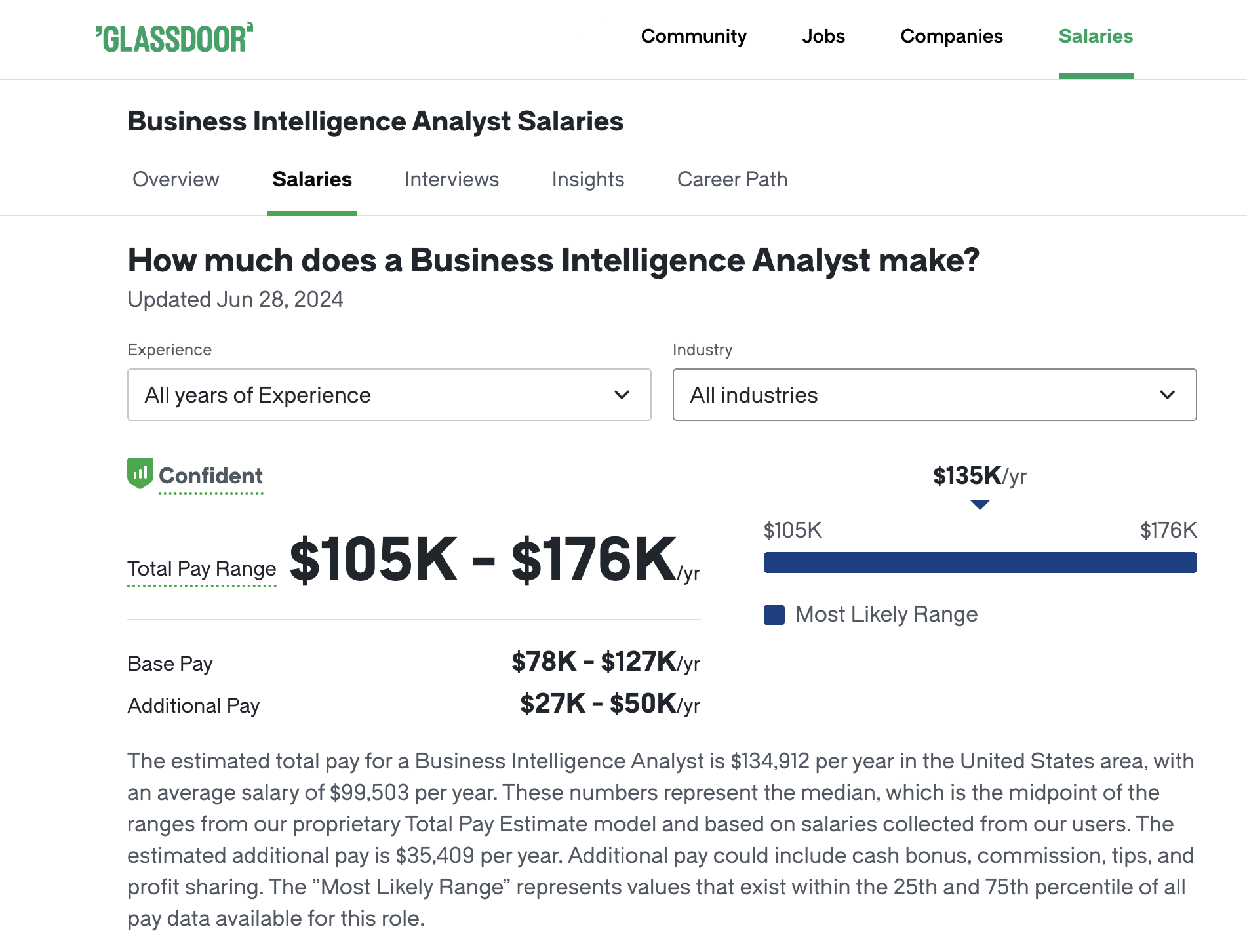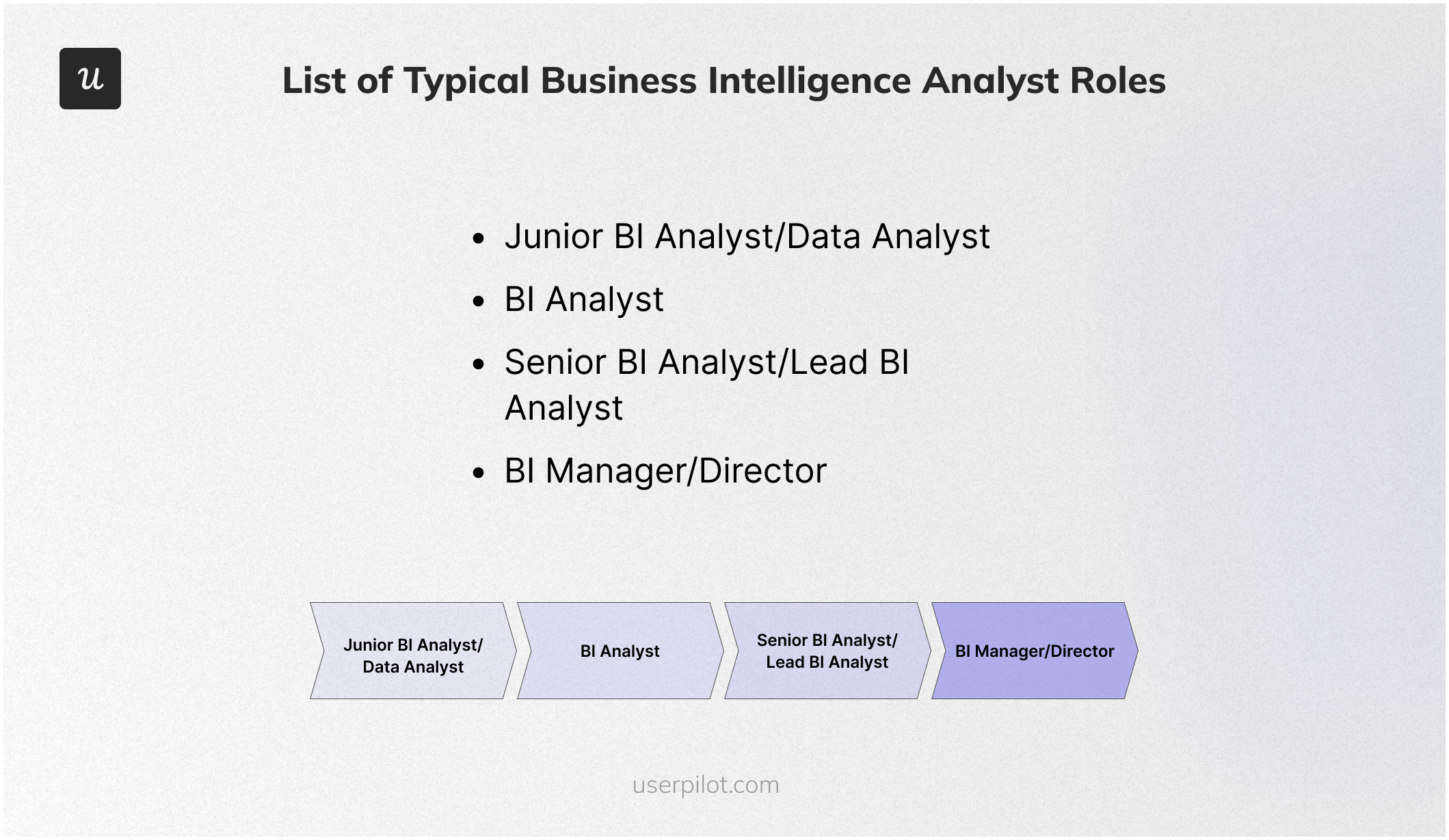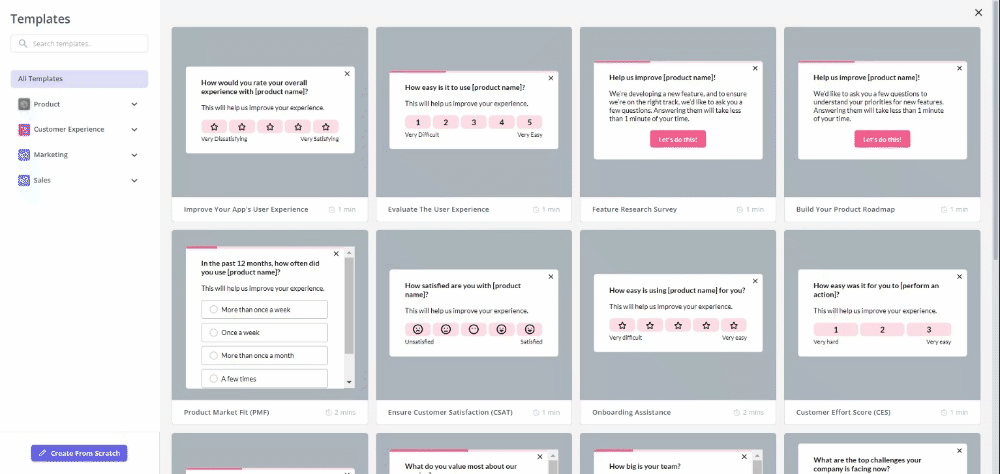
What is a Business Intelligence Analyst? Responsibilities, Salaries, and More
Whether you’re a seasoned professional or new to the field, understanding the nuances of business intelligence analysts is essential for success.
In this guide, we’ll delve into the core responsibilities, salary insights, essential skills, and more, providing you with the knowledge and tools you need to excel as a business intelligence analyst.
Try Userpilot Now
See Why 1,000+ Teams Choose Userpilot

What is a business intelligence analyst?
A business intelligence (BI) analyst is a data specialist who helps businesses translate raw data into actionable insights. They act as a bridge between the world of numbers and the world of business decisions.
What does a business intelligence analyst do?
Business intelligence analysts help gather and clean data, analyze it to find trends, and then translate those insights into clear reports and visuals. This empowers businesses to make data-driven decisions across all aspects of their operations.
Business intelligence analyst’s main responsibilities
A business intelligence (BI) analyst’s core duties revolve around transforming data into knowledge that fuels better business choices. Here’s a quick rundown of their key tasks:
- Data Acquisition and Sorting: They help gather information from various sources like sales figures, customer surveys, and in-app behavior. This data often needs cleaning and organizing to ensure it’s accurate and usable.
- Data Analysis and Storytelling: Once the data is prepped, they leverage their analytical skills and tools to uncover trends, patterns, and hidden insights. They don’t just crunch numbers; they translate their findings into clear and compelling stories through reports, dashboards, and presentations.
- Strategic Decision Support: Ultimately, such data-driven insights can empower informed business decisions. They provide recommendations for product development, marketing strategies, resource allocation, or customer service improvements.
Business intelligence analyst salary

According to Glassdoor data, the estimated total pay for a Business Intelligence Analyst in the United States is $134,912 per year, with a base salary of $99,503 and additional pay of $35,409. The most likely range for total pay is between $105,000 and $176,000 annually.
However, your actual earnings can also depend on several factors, as below:
- Company: Top paying companies include Google, Meta, and NVIDIA, with average total pay exceeding $195,000.
- Industry: Industries like Energy, Mining & Utilities, Real Estate, and Telecommunications often offer higher salaries for BI Analysts.
- Experience: Seniority and experience level play a significant role in determining salary.
- Location: Salaries may vary depending on the cost of living and demand for BI talent in specific regions i.e. San Francisco Bay Area, CA stays on top of the list with payment going up to $167,700 per year.
Business intelligence analyst career path

The career path of a business intelligence analyst is not linear, but there are common stages you can expect as you gain experience and expertise. Here’s a breakdown of the typical career progression:
- Junior BI Analyst/Data Analyst (0-3 Years): At this stage, you’ll typically work under the supervision of senior analysts, assisting with data cleaning, report generation, and basic data analysis.
- BI Analyst (3-5 Years): You’ll take on more responsibility for independent data analysis, report creation, and dashboard development. You’ll likely work closely with business stakeholders to understand their needs and translate them into actionable insights.
- Senior BI Analyst/Lead BI Analyst (5-10+ Years): You’ll lead a team of analysts, oversee complex projects, and develop strategic BI initiatives. You’ll be responsible for ensuring data quality, defining KPIs, and driving data-driven decision-making across the organization.
- BI Manager/Director (10+ Years): You’ll be responsible for overseeing the entire BI function, managing a team of analysts and developers, and setting the overall strategic direction for data-driven initiatives.
As you advance to this position, you can also choose to transition into a data analyst or BI consultant role depending on your interest:
- Data Scientist: If you’re passionate about statistics, machine learning, and predictive modeling, you may transition into a data scientist role.
- BI Consultant: As a consultant, you’ll work with clients to develop and implement BI solutions. This path requires strong business acumen and consulting skills.
Best practices for being a great business intelligence analyst
Becoming a great Business Intelligence (BI) Analyst involves more than just mastering technical skills. It also requires communication and a proactive approach to problem-solving. Here are some best practices to excel in this role:
- Understand the business: A great BI analyst isn’t just a data cruncher; they’re a strategic partner. For instance, if you’re working for an e-commerce company, understand metrics like customer acquisition cost, average order value, and churn rate. This knowledge will help you frame your analysis and deliver insights that directly impact the bottom line.
- Master your tools: Technical proficiency is a must. Become an expert in SQL to efficiently query and manipulate data. Learn to create compelling visualizations using tools like Tableau or Power BI, and leverage advanced features like calculated fields and custom visualizations.
- Data quality is key: “Garbage in, garbage out.” Ensure the accuracy and reliability of your data by establishing robust data cleaning and validation processes. Address missing values, outliers, and inconsistencies before proceeding with analysis. Collaborate with data engineers to implement data governance practices that ensure data integrity, security, and compliance. Remember, your insights are only as good as the data they’re based on.
- Focus on actionable insights: Don’t just present data; tell a story that resonates with stakeholders. Highlight the key findings, their implications for the business, and actionable recommendations. For example, instead of saying “Churn rate increased by 5%,” say “We’ve identified a 5% increase in churn, primarily among customers acquired through social media channels. We recommend focusing on improving onboarding for these customers to increase their lifetime value.”
- Foster collaboration and communication: Building strong relationships with stakeholders is crucial. You should regularly communicate with business users to understand their needs, gather feedback on your reports, and ensure your analyses are relevant and useful.
Business intelligence analyst FAQs
What does a business intelligence analyst do?
Business intelligence (BI) analysts are the data detectives of an organization. They collect, analyze, and interpret complex data sets to uncover meaningful insights that drive informed decision-making.
Does a business intelligence analyst need coding?
While not all BI analyst roles require extensive coding, having some programming skills can be a significant advantage. Basic knowledge of SQL (Structured Query Language) is often necessary for querying databases and manipulating data. Additionally, familiarity with languages like Python or R can be beneficial for more advanced analysis and automation tasks.
What is the role of a BA in business intelligence?
Business analysts (BAs) play a crucial role in bridging the gap between IT and business within the BI process. They work closely with stakeholders to understand their business problems and translate them into actionable data requirements. BAs also collaborate with BI analysts to ensure that the data analysis and visualization align with business objectives and provide meaningful insights for decision-making.
What is an AI business intelligence analyst?
An AI business intelligence analyst leverages artificial intelligence and machine learning techniques to enhance BI processes. They build and deploy AI models to automate data analysis, identify hidden patterns, and generate predictive insights. AI BI analysts also work on integrating AI capabilities into BI tools and platforms.
Conclusion
We hope this guide has provided you with valuable insights into the roles, responsibilities, and rewards associated with this role.
Looking into tools for business intelligence analysts? Userpilot is an all-in-one product platform with engagement features and powerful analytics capabilities. Book a demo to see it in action!








